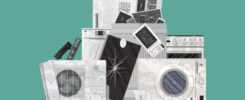The adoption of RFID technology in the healthcare sector is becoming a high priority.
This is because RFID technology offers numerous opportunities for the transformation of this sector, which is subject to new regulations to support the increase in safety and efficiency during surgery. In particular, US regulations require a UDI (Unique Device Identifier) to be placed on each surgical tool by 2020. Europe follows this movement and plans to complete it by 2027.
Let’s go to analyze the benefits of implementing RFID in the healthcare industry
The use of radiofrequency in the health sector offers many opportunities related to patient safety, tracking, efficiencies in care of the patients, and provider satisfaction. For example, some studies demonstrated that the implementation of RFID in the operating room resulted in the following benefits:
- Increase in patient identification verification from 75% pre-implementation, to 100% post-implementation;
- Physician time-out completion rates improved from 43% to 70%;
- Instrument loss decreased from 0.146% to 0.089%.
The RFID is also used in the monitoring of:
- Patients who suffer from Alzheimer’s and dementia;
- Newborn.
In the first case, radiofrequency technology helps the hospital staff to track wandering patients with elopement risks, sending an immediate notification in case of movements. In the context of newborn monitoring, RFID is used to aid in the matching of newborns to their mothers and abduction prevention purposes. One RFID system utilized in a North Carolina hospital was able to notify staff of infant abduction, allowing immediate intervention.
RFID can also improve the efficiency in which healthcare professionals can provide assistance to their patients. Particularly, studies have shown that medication administration times were decreased by 61.5% using the RFID medication cart compared to the Bar Code Medication Administration (BCMA) program. As for, blood sampling times were reduced by 67%. Surgical time delay rates decreased from 4% to 1%, with the average delay time decreased from 25 to 10 minutes.
Barriers to the adoption of RFID technology in the healthcare sector
Although RFID technology is very useful for the healthcare industry, some obstacles could hinder the implementation of radiofrequency technology. The main barriers are represented by the:
- Privacy and security concerns, due to the sensitive information which could be intercepted by unauthorized people;
- Healthcare provider perceptions of the RFID system, they may not feel comfortable to use RFID technology, as they find it difficult to use.
In the past, the obstacles were also represented by the cost of the tags, which in the last few years has significantly decreased, and the technical limitations such as interferences with medical equipment. The interferences were because medical instruments, being mainly of metal, reflecting the signal emitted by the reader which in turn interferes with the communication between the tag and the reader, significantly degrading performance. Fortunately, this no longer represents a barrier today (click here to know why).
How to overcome the barriers?
To overstep the obstacles mentioned above and ensure that RFID technology is successfully adopted within a healthcare organization, it is necessary to follow some recommendations:
- Carry out an accurate cost-benefit analysis,
- Train the staff and instruct them on the appropriate use of the RFID technology. As more the employees are aware of how to use the technology, more efficiency the use of the whole healthcare organization will be;
- Communication with the staff and the patients on the adoption of security measures necessary against cyber attacks. This can aid in the positive perception of privacy and security concerns.
If you want to deepen how to implement RFID technology within your organization with excellent results read
8 steps for a successful RFID implementation
Source: www.himss.org/library/benefits-and-barriers-rfid-technology-healthcare

